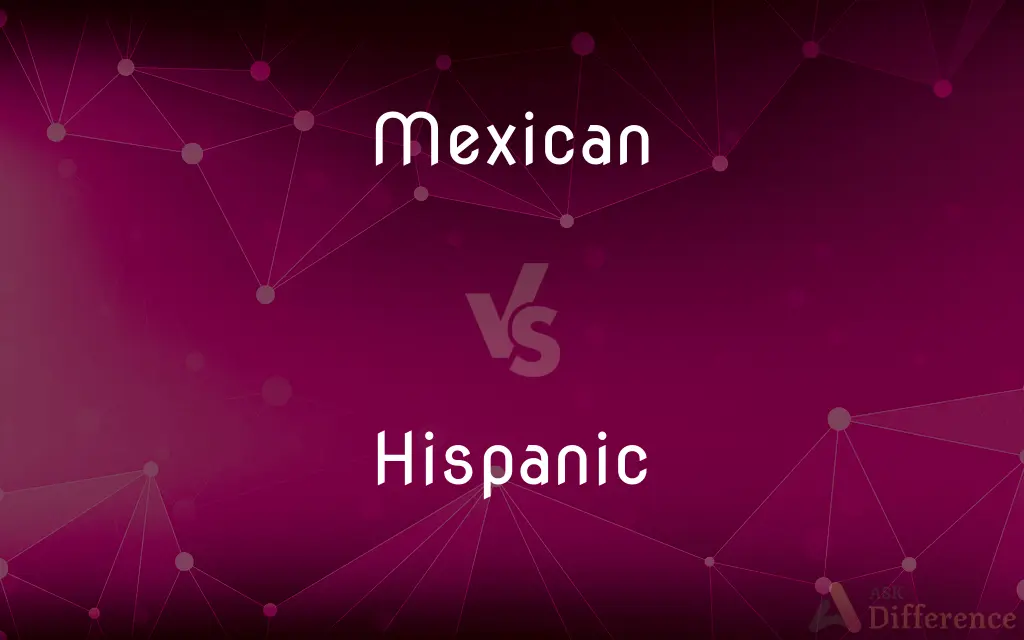Mexican vs. Hispanic — What's the Difference?
Edited by Tayyaba Rehman — By Fiza Rafique — Updated on September 25, 2023
Mexican refers to someone from Mexico, while Hispanic pertains to people from Spanish-speaking countries, including but not limited to Mexico. Both terms denote cultural and linguistic ties but differ in geographical scope.

Difference Between Mexican and Hispanic
Table of Contents
ADVERTISEMENT
Key Differences
Mexican is a term that specifically relates to the country of Mexico, situated in North America. It denotes people who are natives or citizens of this nation. On the other hand, Hispanic is a broader term that refers to people who come from, or have ancestry from, Spanish-speaking countries. This includes numerous nations across Latin America and Spain itself.
Being Mexican indicates a direct connection to Mexico, either by birth, descent, or citizenship. It's tied to the nation's culture, history, and traditions. Conversely, Hispanic, while linguistic in its basis, connects individuals from various countries under the umbrella of the Spanish language. This includes countries from the Iberian Peninsula to the Americas.
Mexico is just one of the many Hispanic countries, and while all Mexicans can be termed Hispanic due to their Spanish-speaking background, not all Hispanics are Mexican. For instance, someone from Argentina or Spain is Hispanic but not Mexican.
The terms Mexican and Hispanic also have cultural implications. Mexico, with its rich history, has cultural practices, traditions, and cuisines unique to it. Meanwhile, Hispanic cultures, spanning multiple countries, share some commonalities due to the Spanish language but have distinct regional variations.
Comparison Chart
Geographical Scope
Pertains to Mexico
Pertains to Spanish-speaking countries
ADVERTISEMENT
Linguistic Basis
Spanish is the official language
Involves Spanish language origins
Cultural Context
Reflects Mexican culture
Reflects cultures of all Spanish-speaking nations
Inclusivity
Specific to people from Mexico
Includes Mexicans but also other Spanish-speaking groups
Example Countries
Mexico
Mexico, Spain, Argentina, Colombia, etc.
Compare with Definitions
Mexican
Pertaining to the culture, traditions, and customs of Mexico.
The Mexican festival of Dia de los Muertos is celebrated vibrantly.
Hispanic
Pertaining to Spain or Spanish-speaking countries.
The Hispanic community celebrated their shared heritage.
Mexican
Relating to the official language of Mexico, which is Spanish.
The Mexican dialect of Spanish has its unique phrases.
Hispanic
A person from, or with ancestry from, a Spanish-speaking country.
He is Hispanic, with roots in both Spain and Chile.
Mexican
Of or relating to the political and geographical entity of Mexico.
The Mexican government announced new reforms.
Hispanic
Denoting the shared culture of Spanish-speaking nations.
Hispanic music genres like salsa and reggaeton are popular.
Mexican
Relating to Mexico or its people
Authentic Mexican cuisine
Hispanic
Reflecting the historical and cultural ties among Spanish-speaking peoples.
The Hispanic influence can be seen in local architecture.
Mexican
A native or inhabitant of Mexico, or a person of Mexican descent
Urban scenes depicting the daily life of Mexicans
Hispanic
The term Hispanic (Spanish: hispano or hispánico) refers to people, cultures, or countries related to Spain, the Hispanidad, Spanish language, culture, or people. The term commonly applies to countries with a cultural and historical link to Spain, formerly part of the Spanish Empire following the Spanish colonization of the Americas, parts of the Asia-Pacific region and Africa.
Mexican
A native or inhabitant of Mexico.
Hispanic
Of or relating to Spain or Spanish-speaking Latin America.
Mexican
A person of Mexican ancestry.
Hispanic
Of or relating to a Spanish-speaking people or culture.
Mexican
Of or relating to Mexico or its people, language, or culture.
Hispanic
A Spanish-speaking person.
Mexican
Of or pertaining to Mexico or its people.
Hispanic
A US citizen or resident of Latin American or Spanish ancestry.
Mexican
A native of inhabitant of Mexico
Hispanic
Of or pertaining to Spain or its language; as, Hispanic words.
Mexican
Of or relating to Mexico or its inhabitants;
Mexican food is hot
Hispanic
An American whose first language is Spanish
Mexican
Denoting the cuisine originating from Mexico.
Mexican tacos are popular worldwide.
Hispanic
Related to or derived from the people or culture of Spain;
The Hispanic population of California is growing rapidly
Hispanic
Relating to the Spanish language.
The Hispanic literature class explored various authors.
Common Curiosities
Can a person from Spain be termed Mexican?
No, a person from Spain is Hispanic but not Mexican.
Does Mexican refer to a specific country?
Yes, Mexican specifically pertains to the country of Mexico.
Can someone from Argentina be termed Mexican?
No, someone from Argentina is Hispanic but not Mexican.
What does Hispanic encompass?
Hispanic refers to people from or with ancestry from Spanish-speaking countries.
Is every Mexican also Hispanic?
Yes, because Mexico is a Spanish-speaking country, all Mexicans are Hispanic.
Do all Hispanic people share the same culture?
No, while there are shared elements, each Spanish-speaking country has its distinct culture.
Which term is more inclusive: Mexican or Hispanic?
Hispanic is more inclusive, as it covers all Spanish-speaking countries.
Which term has a broader geographical scope: Mexican or Hispanic?
Hispanic has a broader geographical scope, encompassing many nations.
Can a person from the U.S. with Mexican ancestry be termed Mexican?
Yes, if they identify with Mexican roots, they can be termed Mexican.
Are Mexican traditions the same across all Hispanic countries?
No, while there might be similarities, each country, including Mexico, has its unique traditions.
Is the term Hispanic tied to race?
No, Hispanic is tied to language and culture, not race.
What language do Mexicans speak?
Mexicans predominantly speak Spanish.
What's the main distinction between Mexican and Hispanic?
Mexican is specific to Mexico, while Hispanic relates to all Spanish-speaking nations.
Are there celebrations that are both Mexican and Hispanic?
Yes, some celebrations, like Cinco de Mayo, are Mexican in origin but celebrated by the broader Hispanic community.
Is the Spanish language uniform among all Hispanic nations?
No, while the base is similar, there are regional dialects and variations in vocabulary.
Share Your Discovery

Previous Comparison
Town vs. District
Next Comparison
Slice vs. FlakeAuthor Spotlight
Written by
Fiza RafiqueFiza Rafique is a skilled content writer at AskDifference.com, where she meticulously refines and enhances written pieces. Drawing from her vast editorial expertise, Fiza ensures clarity, accuracy, and precision in every article. Passionate about language, she continually seeks to elevate the quality of content for readers worldwide.
Edited by
Tayyaba RehmanTayyaba Rehman is a distinguished writer, currently serving as a primary contributor to askdifference.com. As a researcher in semantics and etymology, Tayyaba's passion for the complexity of languages and their distinctions has found a perfect home on the platform. Tayyaba delves into the intricacies of language, distinguishing between commonly confused words and phrases, thereby providing clarity for readers worldwide.














































